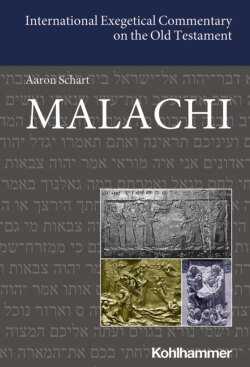Читать книгу Malachi - Aaron Schart - Страница 24
На сайте Литреса книга снята с продажи.
Notes on Text and Translation
Оглавление1a In the context of the superscription the word משׂא, maśśā’, literally “heavy load,” must have a technical meaning and refer to a prophetic genre. The translation “weighty speech” seeks to combine the underlying meaning with its prophetic application. Syntactically it is most probable—contrary to the Masorete’s reading and that of the LXX—that we are dealing with two superscriptions set alongside one another.1 In terms of today’s publishing norms we may compare this to the combination of a title and a subtitle. The first superscription consists only of the term “weighty speech.” The second offers a prepositional addition in which the underlying expression “word of Yhwh” is clarified by the addition of two prepositional phrases.
The LXX did not understand the consonantal text מלאכי as a personal name; otherwise it would have transcribed the Hebrew word, as was usually the case with proper names. Instead it read the word as an honorary title: “my messenger.” It also changed the first-person suffix “my” to the third person “his” because the superscription is not spoken by God but comes from the editor of the document. The expression “Yhwh’s messenger” is also used as a title for Haggai (Hag 1:13), so it was natural for the translator of the Dodekapropheton to read it as a title in Mal 1:1 as well. The LXX adds a challenge to the superscription: “Therefore take (it) to heart!”, which is drawn word for word from the Greek text of LXX Hag 2:15, 18 (twice). It is also referred to in Mal 2:2. The Septuagint thus understands the Malachi document as a continuation of Haggai’s message.
